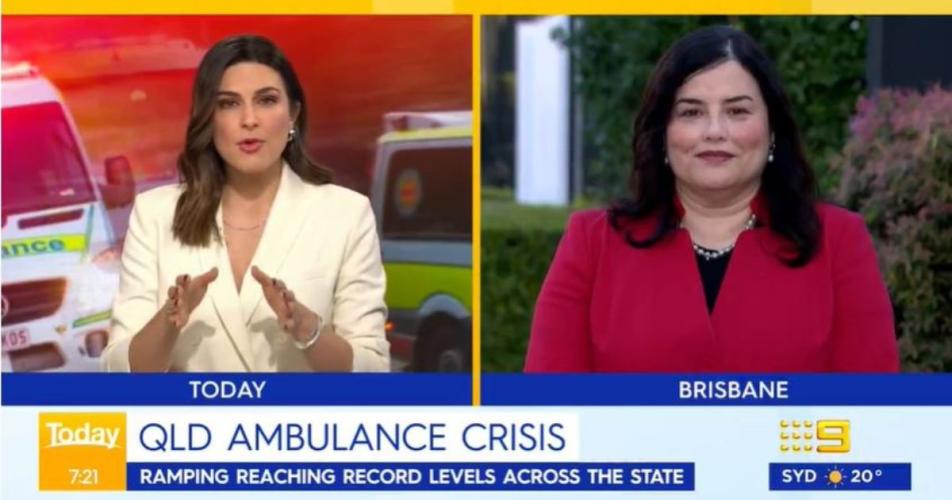Workforce support needed to ease ramping pressures
Our hospitals don't have enough workforce to support Queensland's growing population and the increase in respiratory illnesses, AMA Queensland President Dr Maria Boulton told Today. "That is why we're also calling on the Federal Government to ensure that they are funding more medical student placements so that we can have more doctors on the front line."

Transcript: AMA Queensland President, Dr Maria Boulton, Today with Sarah Abo and Karl Stefanovic, Thursday 23 May 2024
Subjects: Ambulance ramping
SARAH ABO: The Queensland Government is under pressure to act this morning after a patient who lived a minute away from hospital died while waiting nearly half an hour for an ambulance. It's the latest in a series of deaths, with ambulance ramping at a record high. For more, we're joined by the President of the Australian Medical Association in Queensland, Dr Maria Boulton. Maria, thanks so much for your time. More than 45 per cent of Queensland patients arriving to hospital via ambulance are waiting more than 30 minutes to be treated. I mean, that is unacceptable.
DR MARIA BOULTON: It is Sarah. It is completely unacceptable and such tragic news about this patient who died waiting, and our thoughts go to his family and friends. It is really devastating for healthcare workers too, doctors, nurses and paramedics who are doing their best in a system that's broken. They are under such pressure, and they do their absolute best. This is terrible news for them as well.
SARAH ABO: I was going to ask you about that, doc, because this is the issue. You've got these people on the front line who are trying their best to treat those who desperately need assistance at a time of medical need, and yet their hands are tied, they're helpless.
DR MARIA BOULTON: That's right, Sarah, and sometimes they're too scared to speak out. AMA Queensland represents doctors at every career stage, and I can tell you that we get phone calls all the time from members who are working in emergency departments, hospital units, general practice who are screaming out for more support for their patients. It's really hard out there. They're doing their absolute best with very little funding, not enough workforce and not enough support.
SARAH ABO: What you raised there about funding, that's an interesting one, because we know the Queensland Government is really continuing to sort of throw money at the problem, hoping that it will get fixed. The Federal Government is also financially doing what it can, yet this problem only seems to be getting worse. I think a lot of people out there don't quite understand why. If we're talking about millions, sometimes billions across the country to assist when it comes to hospitals, and in this case for ramping, why aren't we seeing improvements?
DR MARIA BOULTON: The reality is that there seems to have been a lot of poor planning, and we're playing catch up when it comes to workforce, hospital beds and resources. Our population is growing, we're seeing more patients due to the respiratory illnesses out there, but at the end of the day we don't have enough workforce and that is our number one priority. We don't seem to have a workforce plan, we don't understand how many healthcare workers we need in each location, particularly in Queensland, which is such a decentralised state. I can tell you that we're definitely not training enough healthcare workers, there's not enough nurses and there's not enough medical student placements. That is why we're also calling on the Federal Government to ensure that they are funding more medical student placements so that we can have more doctors on the front line.
SARAH ABO: Just quickly, Maria, is there a silver bullet for this?
DR MARIA BOULTON: I think it will take some time. We are waiting for the 3,000 new hospital beds that have been funded and promised. I think more needs to be done when it comes to workforce, and that's not going to be a quick fix. We do recruit a lot from overseas, which is what we need to do currently, but we also need to ensure that all those training pathways for nurses and doctors, that there's more of them so that they can be easily accessed, particularly in regional and rural areas.
SARAH ABO: Maria, thank you so much for that insight. Appreciate it.



